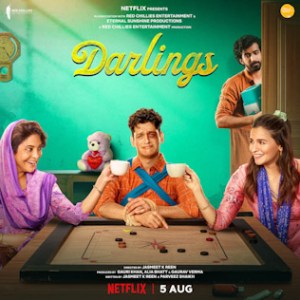Watch Rocky Aur Rani Kii Prem Kahaani on Amazon Prime
Rocky Aur Rani Kii Prem Kahaani is an overwhelming sensory experience. Every frame is full of vibrant colors, dynamic visuals, and stirring music. A packed movie theater provides the ideal immersive experience for this kind of film. However, watching at home — as I did on a TV screen with an audience of two — it’s harder to ignore the things about Rocky Aur Rani that don’t work.
The performances by the all-star cast are firmly in the category of Things That Work. Ranveer Singh plays the titular Rocky, heir to a sweets company established by his stern grandmother Dhanalaxmi Randhawa (Jaya Bachchan) and run by his equally stern father Tijori (Aamir Bashir). Rocky is nothing like his buttoned-up progenitors, as in he prefers to wear his garishly patterned shirts mostly unbuttoned. He speaks mangled English as he drives around in his expensive sports cars.
Rocky dotes on his grandfather Kanwal (Dharmendra), who suffers from mobility and memory issues. When grandpa utters the name “Jamini” and points to a torn old photo of a woman, Rocky sets out to find her.
Jamini (Shabana Azmi) turns out to be a former flame Kanwal met at a poetry conference, after he was already married to Dhanalaxmi. Rocky meets Jamini’s granddaughter Rani (Alia Bhatt) — a quick-witted TV news anchor — who helps reunite the former lovers on the sly. Coordinating secret meetings between the older couple sparks romance between the younger couple, despite some big differences between them. Rani is as educated and driven as Rocky is not, but ultimately hotness trumps all.
As with every Karan Johar-directed picture, it’s all about loving your family, so Rocky and Rani agree to spend three months (!!!) living with their respective future-in-laws to see if the two clans can co-exist. (Apparently, the love affair between Rocky’s grandpa and Rani’s grandma is not a deal breaker.) Rocky moves in with Rani’s cultured, liberal Bengali family and is immediately clowned upon, and granny Dhanalaxmi freezes out Rani. Things look bleak for our sexy heroes.
The drama, laughs, and heartache in Rocky Aur Rani are punctuated with some grand and truly memorable musical numbers, like the catchy “What Jhumka?” and the visually stunning celebration “Dhindhora Baje Re.” In a funny twist, the only time Rocky ever dresses in a sophisticated manner is during the song “Tum Kya Mile,” when he’s a figment of Rani’s imagination while she’s on a work trip in Kashmir.
The performances overall are charming, with Bhatt again showing that she’s at the top of her game as Rani. Singh is careful to make Rocky a goofball but not an irritant, and it’s always clear that there’s a real person inside the flashy attire. Bachchan also makes the most of her role as mean grandma.
That leads to one of the things that didn’t work for me about Rocky Aur Rani. I’m not sure how an unsophisticated guy like Rocky comes from the family he does. Knowing that he will one day take over the family business, wouldn’t his dad and grandma have sent him overseas to get an MBA and made sure he behaved with perfect decorum? Other than shaming him for his love of dancing, they don’t seem to care what he does. Rocky and his family feel like they belong in two different movies.
I also struggled to nail down the movie’s moral point of view. Rocky Aur Rani makes no secret of when it’s moralizing, with poignant music cueing the audience to pay attention to the meaningful bits. But some of the messages come from strange angles, such as when Rani’s mom Anjali (Churni Ganguly) makes Rocky wear a bra in public in order to teach him gender equality. I have doubts about the lingerie store’s employees participating in an act deliberately meant to humiliate a patron.
Then there’s Rocky’s speech about making socially regressive missteps because he wasn’t taught not to. Singh’s delivery is heartfelt, but it’s strange to hear Rocky ask for leniency because he didn’t know it was rude to make fun of people for their skin color or weight. The whole thing feels like a aging white male standup comic in America lamenting that “you can’t say anything anymore” before ranting about “snowflakes.”
To reiterate what I stated at the start of this review, I think these plot issues may be less glaring when one is watching Rocky Aur Rani Kii Prem Kahaani in a theater on a giant screen with surround sound. Unfortunately, now that its theatrical run is over, the inconsistencies are more apparent.
Links
[Disclaimer: my Amazon links include an affiliate tag, and I may earn a commission on purchases made via those links. Thanks for helping to support this website!]









